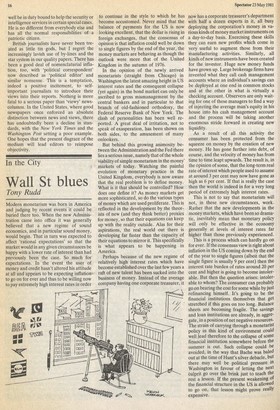In the City
Wall St blues
Tony Rudd
Modern monetarism was born in America and judging by recent events it could be buried there too. When the new Administration came into office it was generally believed that a new regime of sound economics, and in particular sound money, would begin. That in turn was expected to affect 'rational expectations' so that the market would in any given circumstances be happy with a lower rate of interest than had previously, been the case. So much for expectations. In the event the user of money and credit hasn't altered his attitude at all and appears to be expecting inflation to go on for ever and thus to be willing now to pay extremely high interest rates in order to continue in the style to which he has become accustomed. Never mind that the balance of payments for the US is now looking excellent, that the dollar is rising in foreign exchanges, that the consensus of opinion is that inflation could well be down to single figures by the end of the year, the money markets are behaving as though the outlook were more that of the United Kingdom in the autumn of 1976.
In the opinion of the newly arrived monetarists (straight from Chicago) in Washington the latest amazing height in US interest rates and the consequent collapse (yet again) in the bond market can only be ascribed to gross mismanagement by the central bankers and in particular to that branch of old-fashioned orthodoxy, the Federal Reserve Bank of New York. The clash of personalities has been well reported. A great deal of irritation, not to speak of exasperation, has been shown on both sides, to the amusement of many onlookers.
But behind this growing animosity between the Administration and the Fed there lies a serious issue, namely that of the whole viability of simple monetarism in the money' markets of today. Watching the painful evolution of monetary practice in the United Kingdom, everybody is now aware that the real problem is to define money. What is it that should be controlled? How does one define it? As money markets get more sophisticated, so do the various types of money which are used proliferate. This is reflected in the development by the theorists of new (and they think better) proxies for money, so that their equations can keep up with the reality outside. Alas for their aspirations, the real world out there is developing far faster than the capacity of their equations to mirror it. This specifically is what appears to be happening in America.
Perhaps because of the new regime of relatively high interest rates which have become established over the last few years a raft of new talent has been sucked into the business of money. Instead of the average company having one corporate treasurer, it now has a corporate treasurer's department with half a dozen experts in it, all busy deploying the corporation's money in various kinds of money market instruments on a day-to-day basis. Exercising these skills they can earn new profits which come in very useful to augment those from their manufacturing activities. Similarly, all kinds of new instruments have been created for the investor. Huge new money funds have grown up. Large brokerage firms have invented what they call cash management accounts where an individual's savings can be deployed at one end in common stocks and at the other in what is virtually a checking account. Observers are only waiting for one of these managers to find a way of injecting the average man's equity in his house into his cash management account and the process will be taking another enormous stride forward in creating new liquidity.
As a result of all this activity the consumer has been protected from the squeeze on money by the creation of new money. He has gone further into debt, of course, and the velocity of money has from time to time leapt upwards. The result is, in the opinion of some, that the long-term real rate of interest which people used to assume at around 3 per cent may now have gone as high as 6 per cent. If that is really the case then the world is indeed in for a very long period of extremely high interest rates.
This is not to say that monetarism will not, in these new circumstances, work. Rather that the new developments in the money markets, which have been so dramatic, inevitably mean that monetary policy will only be effective in the economy generally at levels of interest rates far higher than those previously experienced.
This is a process which can hardly go on for ever. If the consensus view is right about inflation in the US coming down by the end of the year to single figures (albeit that the single figure is usually 9 per cent) then the interest rate burden of rates around 20 per cent and higher is going to become intolerable. But then the question arises: intolerable to whom? The consumer can probably go on bearing the cost for some while by just refinancing himself. It's going to be the financial institutions themselves that get stretched if this goes on too long. Balance sheets are becoming fragile. The savings and loan institutions are already, in aggregate, in a position of net negative resources. The strain of carrying through a monetarist policy in this kind of environment could well lead therefore to the collapse of some financial institution somewhere before the summer is out. Such collapse could be avoided, in the way that Bache was baled out at the time of Hunt's silver debacle, but there may well be political pressure In Washington in favour of letting the next tulprit go over the brink just to teach the rest a lesson. If the present weakening of the financial structure in the US is allowed to go on, that lesson might prove really expensive.










































 Previous page
Previous page